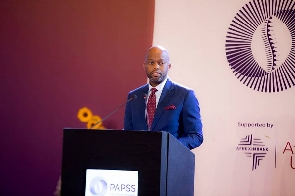 AfCFTA Secretary-General, Wamkele Mene
AfCFTA Secretary-General, Wamkele Mene
The African Continental Free Trade Area (AfCFTA) agreement has made significant progress in the last few years, thanks to the commitment of the continent’s heads of state, Wamkele Mene, Secretary-General of the AfCFTA Secretariat, has said. Speaking at a meeting with media managers, Mr Mene said the secretariat had been able to make significant progress in trade rules, especially the rules of origin, which are key to measuring the movement of goods across borders. He said with over 5,000 different products being traded on the continent, it was always going to be difficult, adding that a fragmented regime was an affront to trade and investment. “We have now been able to negotiate almost 90 per cent of the rules of origin. So, 5,000 products that we have in Africa we now have agreement close to 90 per cent. It is a remarkable achievement,” adding that every single item has to be negotiated. “We’ve produced all the certified documents to trade with and it is now up to the member states to cooperate diligently with the process to make sure that trade is fully exploited,” the Secretary-General noted. However, he said negotiations are still ongoing on textiles, sugar and automobiles, adding that the textile sector, for instance, was very sensitive to most countries because of its nature of job creation and the capacity to absorb millions of people. “So, most countries are apprehensive of the liberalization of textiles and so also is the auto sector. Some countries are advanced in the auto sector,” he said. Mr Mene said the continent would start trading based on the rules of origin agreement, adding that all the documents needed to begin the trade are in place and those member countries needed to ensure that trade duly happened. He said some countries including Ghana, Egypt, Kenya, Cameroon and Mauritius have their customs systems in place, which could allow them to import, and export based on the agreed rules of origin.
The African Continental Free Trade Area (AfCFTA) agreement has made significant progress in the last few years, thanks to the commitment of the continent’s heads of state, Wamkele Mene, Secretary-General of the AfCFTA Secretariat, has said. Speaking at a meeting with media managers, Mr Mene said the secretariat had been able to make significant progress in trade rules, especially the rules of origin, which are key to measuring the movement of goods across borders. He said with over 5,000 different products being traded on the continent, it was always going to be difficult, adding that a fragmented regime was an affront to trade and investment. “We have now been able to negotiate almost 90 per cent of the rules of origin. So, 5,000 products that we have in Africa we now have agreement close to 90 per cent. It is a remarkable achievement,” adding that every single item has to be negotiated. “We’ve produced all the certified documents to trade with and it is now up to the member states to cooperate diligently with the process to make sure that trade is fully exploited,” the Secretary-General noted. However, he said negotiations are still ongoing on textiles, sugar and automobiles, adding that the textile sector, for instance, was very sensitive to most countries because of its nature of job creation and the capacity to absorb millions of people. “So, most countries are apprehensive of the liberalization of textiles and so also is the auto sector. Some countries are advanced in the auto sector,” he said. Mr Mene said the continent would start trading based on the rules of origin agreement, adding that all the documents needed to begin the trade are in place and those member countries needed to ensure that trade duly happened. He said some countries including Ghana, Egypt, Kenya, Cameroon and Mauritius have their customs systems in place, which could allow them to import, and export based on the agreed rules of origin.